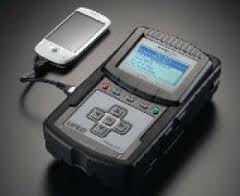Can Police Search Your Cell Phone?
This is a question that I am often asked as a criminal defense lawyer. Typically, the person was under arrest at then time of the warrantees search. More important to my client is the incriminating evidence recovered from the phone such as text messages discussing the price and weight of certain non-pharmaceutical products that are not sole over the counter.
Search Incident to Arrest
The U.S. Supreme Court has established that police can conduct a warrantless search of a person incident to arrest. See Chimel v. United States. This includes the area within an arrestee’s immediate control to protect against physical danger and to prevent the destruction or concealment of evidence. A few years later in United States v. Robinson, the Court ruled that police could open closed containers when searching incident to arrest.
Cell Phone Search Incident to Arrest
The first cases began to appear in the mid 1990’s where police would search pagers and beepers from suspected drug dealers. These searches were upheld on the basis that the pagers were electronic containers and precedent granted searches of closed containers.
In the 2000’s, police quickly recognized the importance of searching cell phones of suspected drug dealers to retrieve the text messages. The most prominent case in upholding the search of a cell phone incident to arrest is United States v. Finley. The defendant was searched incident to arrest following a police staged drug sale where the officers recovered incriminating text messages related to drug trafficking. The court did not recognize any conceptual difference between physical containers and electronic equipment for digital information.
Proposed legislation – Search Warrant for Cell Phones
South Carolina is not known for being a progressive leader when it comes to legislation but this proposed bill is a step in the right direction when dealing with searching cell phones and their data incident to arrest. A search warrant requires a detached neutral third party (judge) to sign off on a search warrant prior to its execution. I will keep you updated on the success of this proposed bill.
A BILL
TO AMEND THE CODE OF LAWS OF SOUTH CAROLINA, 1976, BY ADDING SECTION 17-13-180 TO DEFINE THE TERM “CELLULAR OR OTHER PORTABLE ELECTRONIC WIRELESS COMMUNICATIONS DEVICE” AND TO PROHIBIT THE SEARCH OF CELLULAR OR OTHER PORTABLE ELECTRONIC WIRELESS COMMUNICATIONS DEVICES INCIDENT TO A LAWFUL CUSTODIAL ARREST WITHOUT A SEARCH WARRANT OR WITHOUT THE EXPRESS WRITTEN PERMISSION OF THE PERSON OR OTHER LAWFUL OWNER OF THE DEVICE.
Be it enacted by the General Assembly of the State of South Carolina:
SECTION 1. Chapter 13, Title 17 of the 1976 Code is amended by adding:
“Section 17-13-180. (A) As used in this section, ‘cellular or other portable electronic wireless communications device’ means a moveable or transportable device that is capable of creating, receiving, accessing, or storing electronic data or communications and includes, but is not limited to, cellular telephones or ‘smart phones’.
(B) Notwithstanding another provision of law, information contained or stored in a cellular or other portable electronic wireless communications device is not subject to a search by a law enforcement officer incident to a lawful custodial arrest except pursuant to the provisions of Section 17-13-140 providing for the issuance, execution, and return of a search warrant or pursuant to the express written consent of the person subject to the lawful custodial arrest or other lawful owner of the device.”
SECTION 2. The repeal or amendment by this act of any law, whether temporary or permanent or civil or criminal, does not affect pending actions, rights, duties, or liabilities founded thereon, or alter, discharge, release or extinguish any penalty, forfeiture, or liability incurred under the repealed or amended law, unless the repealed or amended provision shall so expressly provide. After the effective date of this act, all laws repealed or amended by this act must be taken and treated as remaining in full force and effect for the purpose of sustaining any pending or vested right, civil action, special proceeding, criminal prosecution, or appeal existing as of the effective date of this act, and for the enforcement of rights, duties, penalties, forfeitures, and liabilities as they stood under the repealed or amended laws.
SECTION 3. This act takes effect upon approval by the Governor.
Charleston Criminal Defense Attorney
If you have a case involving a police cell phone search call an experienced and trusted Charleston criminal attorney at the Dale Savage Law Firm today for a free case consultation (843) 530-7813.

